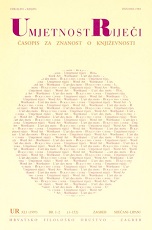Poetska funkcija jezika i igra
The Poetic Function of Language and Play
Author(s): Živa BenčićSubject(s): Literary Texts
Published by: Hrvatsko filološko društvo
Keywords: Russian avant-garde writers; poetry as language in its aesthetic function; Roman Jakobson; avant-garde dualism poetic language; structural functionalist antagonism beween poetic language and practical language; complex sheme of verbal communication; commu
Summary/Abstract: Russian avant-garde writers, led by a strong ludic impulse at the moment of their appearance on the literary scene, crucially influenced Jakobson’s concept of »the literary«. The idea of poetry as »language in its aesthetic function«, already formulated in Jakobson’s Moscow-period works (Recent Russian Poetry, 1921), relies on an early avant-garde dualism poetic language – practical language. An analogy can easily be drawn with the opposition play – work (lack of external purpose, autonomy vis-a-vis reality, the principle of lack of economy / purposefulness, inclusion into active life, the principle of economy). When, several decades later (Closing Statement: Linguistics and Poetics, 1960) Jakobson replaced his structural functionalist antagonism between poetic language and practical language by a more complex scheme of verbal communication, the demarcation line of poetry remained drawn where Russian avant-garde poets would have marked it before they placed their creative work at the service of revolution. According to Jakobson, the differentia specifica of poetic art can still be reduced to its being autotelic and founded on immanent regularities and rules. This, in turn, allows us to connect the concept of the poetic function of language with the concept of play, drawing on a long tradition in the history of European thought (Platon, Schiller, Nietzsche, Huizinga, Fink etc.).
Journal: Umjetnost riječi
- Issue Year: 1997
- Issue No: 1-2
- Page Range: 87-98
- Page Count: 11
- Language: Croatian
- Content File-PDF

